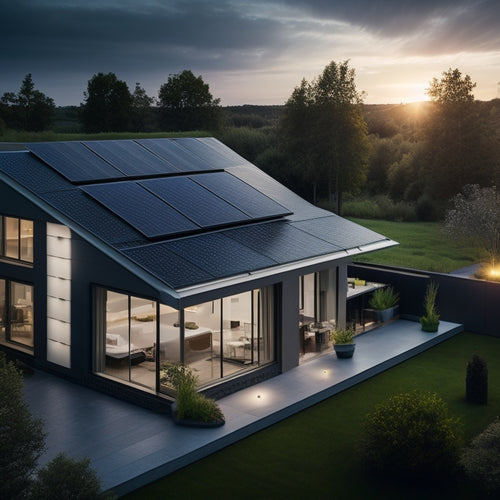
Small Solar System With Battery
Share
You're considering a small solar system with a battery, a smart move that can reduce your reliance on the grid by up to 90%. This combo guarantees energy independence, capturing excess energy during sunny periods for later use during non-sunny times. By utilizing a renewable energy source, you'll decrease your carbon footprint and have more control over your energy usage. To achieve self-sufficiency, you'll need to assess your energy requirements, choose the right battery type, and consider a high-efficiency inverter that maximizes energy harvesting. As you investigate this path, you'll uncover more ways to optimize your off-grid energy system and reap the benefits of a cleaner, more autonomous lifestyle.
The Essentials
- Small solar systems with batteries enable off-grid energy independence, reducing reliance on the grid and providing backup power during non-sunny periods.
- Solar-battery combos guarantee energy generation and storage for later use, promoting self-sufficiency and autonomy through renewable energy sources.
- Reliable energy storage solutions, such as deep cycle batteries, capture excess energy and maximize renewable potential, supporting uninterrupted power supply.
- Proper battery selection, sizing, and maintenance are crucial for optimal performance, longevity, and cost savings on replacements.
- High-efficiency inverters with maximum power tracking (MPT) optimize energy capture from sunlight, adapting to environmental changes for enhanced energy production.
Off-Grid Energy Independence Guaranteed
You're taking a significant step towards energy independence with a small solar system and battery.
By utilizing a renewable energy source like solar power, you're reducing your reliance on the grid.
With off-grid solar power systems, you'll have the freedom to generate your own energy and store it for later use.
This self-sufficient approach guarantees you're not held back by traditional grid-based energy constraints.
With energy storage solutions like batteries, you'll have a reliable backup when the sun isn't shining, assuring a steady supply of power when you need it most.
Renewable Energy Source
A solar-battery combo serves as a reliable renewable energy source, guaranteeing off-grid energy independence. You can utilize the power of the sun to fuel your daily needs, reducing your reliance on the grid and enjoying the freedom that comes with it.
With advancements in solar panel technologies, you can generate clean energy efficiently, even on cloudy days. This means you can power your home, cabin, or RV without worrying about energy policy changes or rate hikes.
By integrating solar panels, a charge controller, inverter, and battery storage into a single, compact unit, All in One Solar Power System simplifies the shift to renewable energy, assuring a steady power supply even when the grid is down.
A small solar system with a battery backup guarantees a steady supply of electricity, giving you the autonomy to live life on your terms. By investing in a solar-battery combo, you're not only reducing your carbon footprint but also gaining control over your energy needs.
Say goodbye to utility bills and hello to a sustainable, self-sufficient lifestyle. With a renewable energy source like solar power, you're one step closer to achieving true energy independence.
Energy Storage Solutions
Utilizing the power of solar energy requires a reliable energy storage solution to guarantee off-grid independence. As you commence on your expedition to energy freedom, you'll need to contemplate the right battery type and storage capacity to meet your power needs.
With the ability to capture excess energy and reduce reliance on the grid, solar battery storage is key to maximizing your renewable energy potential. By leveraging advanced home power backup systems, you can secure a seamless backup power supply even during outages.
You have several battery types to choose from, including lead-acid, lithium-ion, and saltwater batteries. Each has its pros and cons, so it's crucial to research and select the one that best fits your system's requirements. For instance, lithium-ion batteries are popular for their high energy density and long lifespan, while lead-acid batteries are more affordable but heavier and less efficient.
When selecting a battery, contemplate the storage capacity you need to guarantee uninterrupted power supply during periods of low sunlight or at night. A general rule of thumb is to oversize your battery bank by 1.5 to 2 times your daily energy needs.
This guarantees you have enough power to last through extended periods of low energy production. By choosing the right battery type and storage capacity, you'll be well on your way to achieving off-grid energy independence.
Low Carbon Footprint Guaranteed
You're choosing an eco-friendly energy source with a small solar system that guarantees a low carbon footprint.
By utilizing renewable energy from the sun, you're greatly reducing your reliance on fossil fuels and subsequently decreasing carbon emissions.
With energy efficiency and green living(https://www.illchanterl.com) in mind, you're also reducing your electricity bill and contributing to a cleaner environment.
This results in a cleaner, more sustainable energy solution that benefits both you and the environment.
Eco-Friendly Energy Source
Operating off the grid or supplementing your traditional energy supply with a small solar system means embracing an eco-friendly energy source that's gentle on the planet. You'll be utilizing the power of the sun to generate electricity, reducing your reliance on fossil fuels and minimizing your environmental impact.
By choosing a small solar system, you'll enjoy several benefits that come with utilizing renewable energy. Here's a breakdown of the advantages:
| Solar Panel Benefits | Environmental Impact | Your Gain |
|---|---|---|
| Renewable energy source | Reduces greenhouse gas emissions | Energy independence |
| Zero noise pollution | Minimizes air pollution | Quiet operation |
| Low maintenance | Conserves water | Reduced O&M costs |
| Energy self-sufficiency | Reduces reliance on fossil fuels | Increased energy security |
| Government incentives available | Supports sustainable development | Potential tax benefits |
With a small solar system, you'll be taking a significant step towards reducing your carbon footprint and contributing to a cleaner, healthier environment. By going solar, you'll not only reduce your energy bills but also play an important role in promoting sustainable living.
Reduced Carbon Emissions
As you employ the power of the sun with your small solar system, you're greatly decreasing your reliance on fossil fuels, which in turn reduces your carbon emissions.
This significant decrease in carbon emissions is an essential step towards a sustainable lifestyle, allowing you to minimize your carbon footprint and contribute less to environmental pollution. By utilizing renewable energy, you're effectively offsetting the carbon emissions that would have been produced by traditional energy sources.
This reduction in carbon emissions not only benefits the environment but also translates to cost savings for you.
With a small solar system, you can enjoy a cleaner, more efficient, and more cost-effective way of powering your home or business.
By choosing to invest in renewable energy, you're taking a proactive approach to reducing your carbon footprint and promoting a sustainable future.
As you continue to rely on solar power, you'll be making a significant contribution to a cleaner environment, and that's a freedom worth fighting for.
Deep Cycle Battery Technology
You'll want to contemplate two vital factors when selecting a deep cycle battery for your small solar system: battery life expectancy and cycle depth.
When it comes to maximizing renewable energy storage, high-performance batteries play an essential role solar power system battery.
The lifespan of your battery is directly tied to how well it's suited for deep discharge cycles, so understanding the manufacturer's ratings is imperative.
Battery Life Expectancy
Deep cycle batteries, designed to provide a steady flow of energy over an extended period, have a limited lifespan that depends on various factors, including the number of charge cycles, depth of discharge, and maintenance practices.
You should expect a typical deep cycle battery to last around 5-7 years, with some lasting up to 10 years or more. However, this lifespan can be greatly influenced by how well you maintain your battery. Proper battery maintenance tips, such as regularly checking the electrolyte level, making sure the terminals are clean, and avoiding extreme temperatures, can help extend the life of your battery.
When your battery's lifespan finally comes to an end, you'll need to look into battery replacement options. You can either opt for a new deep cycle battery or investigate alternative energy storage solutions.
Regardless of the option you choose, it's crucial to carefully evaluate your energy needs and select a replacement that meets your specific requirements. By understanding the factors that affect battery life expectancy and following proper maintenance practices, you can maximize the lifespan of your deep cycle battery and guarantee a reliable supply of energy for your off-grid system.
Cycle Depth Matters
Ideal energy storage relies on a delicate balance between battery performance and longevity, with cycle depth playing a crucial role in this equation.
As you design your small solar system with a battery, you'll want to understand the significance of cycle depth in deep cycle battery technology. Cycle depth refers to the percentage of the battery's capacity you're using each cycle. You can optimize your battery's performance by limiting the depth of discharge to 50% or less. This approach will prolong your battery's lifespan and reduce maintenance needs.
When you optimize your cycle depth, you're fundamentally avoiding extreme charge and discharge cycles. This helps prevent battery wear and tear, reducing the risk of premature failure.
Effective battery maintenance involves monitoring your cycle depth and adjusting your charging habits accordingly. By doing so, you'll guarantee your battery operates within its recommended specifications, leading to a longer lifespan and reduced replacement costs.
Assess Your Energy Requirements
You need to understand your power consumption patterns to determine the size of your solar system and battery.
Identify which appliances are essential and prioritize their energy usage to guarantee you have enough power when you need it.
Consider the capacity of your energy storage units and the efficiency of your grid tie inverters(https://www.illchanterthislater.com) to optimize your system's performance.
Power Consumption Patterns
As your solar system's energy storage capacity is directly tied to the amount of power it can provide, understanding your energy requirements is crucial. You need to identify your power consumption patterns to determine how much energy you need to store. This involves analyzing your energy usage habits, including the types of appliances you use, their power ratings, and the duration of their operation.
You can start by conducting a consumption analysis to identify areas where you can improve energy efficiency. Look for opportunities to reduce your energy consumption, such as replacing traditional incandescent bulbs with LED bulbs or using energy-efficient appliances. This won't only reduce your energy bills but also allow you to store more energy in your battery.
To get an accurate representation of your power consumption, you can use energy monitoring tools or devices that track your energy usage. This data will help you understand your energy requirements and determine the right size of your solar system and battery.
Energy Usage Priority
Identifying your energy usage priority is crucial in evaluating your energy requirements, since it enables you to allocate your solar system's energy storage capacity effectively.
This means you'll need to assess your daily energy needs and rank them in order of importance. Start by categorizing your appliances into essential and non-essential loads.
Essential loads include refrigeration, lighting, and communication devices, while non-essential loads include entertainment systems and hair dryers.
Higher Efficiency Inverter Included
You'll appreciate the inclusion of a high-efficiency inverter in your small solar system with battery, as it enables maximum power tracking to optimize energy harvest.
This feature guarantees that your system captures the most power possible from the available sunlight, even when the sun's irradiance varies.
Maximum Power Tracking
In your quest for ideal energy harvesting, incorporating a maximum power tracking (MPT) system into your small solar setup is essential. This technology allows your system to enhance energy production by continuously monitoring and adapting to changes in sunlight, temperature, and other environmental factors.
By doing so, you can achieve maximum efficiency and solar enhancement, ensuring that your system operates at its highest potential.
MPT works by rapidly sampling the solar array's output voltage and current to identify the best operating point. This information is then used to adjust the inverter's operating parameters, ensuring that the maximum amount of power is extracted from the solar array.
The result is increased energy production, reduced waste, and a more efficient system overall.
In your small solar system with a battery, MPT is particularly important as it enables you to maximize your energy storage capacity. By enhancing energy production, you can charge your battery more efficiently, providing you with the freedom and independence you desire.
With an MPT system, you can rest assured that your solar setup is working at its best, giving you the energy independence you need to live life on your terms.
Frequently Asked Questions
Can I Add More Solar Panels to the System Later?
You can expand your system later, but you'll need to guarantee the new panels are compatible with your existing setup to avoid efficiency losses, so choose panels with matching voltage and wattage ratings for seamless system expansion.
Is the System Eligible for Government Rebates and Incentives?
When you invest in renewable energy, you're not just utilizing the sun's power, you're also accessing government perks! You'll be thrilled to know that your system is likely eligible for rebate eligibility and incentive programs, saving you even more green.
How Long Does It Take to Install the Solar System?
When getting a solar system, you're probably wondering how long the installation takes. The installation timeline depends on various installation factors, including system size, roof complexity, and local permits, but typically ranges from a few days to a few weeks.
Can I Use the System to Charge My Electric Vehicle?
You're the expert of your energy destiny, unfastening the power to fuel your electric vehicle. Yes, you can charge it with this system, but consider the charging efficiency and battery capacity to guarantee a seamless, liberating experience on the open road.
Is the System Covered by a Warranty or Guarantee?
When considering a purchase, you'll want to know if it's backed by a reliable warranty or guarantee. You'll want to review the warranty terms and guarantee duration to make certain you're protected in case anything goes wrong.
Final Thoughts
You've made the smart decision to invest in a small solar system with a battery. With this setup, you're assured off-grid energy independence and a low carbon footprint. By leveraging deep cycle battery technology and evaluating your energy requirements, you'll maximize your system's efficiency. Plus, the included higher efficiency inverter guarantees superior energy conversion. Did you know that a small solar system can save up to 5 tons of CO2 emissions annually? That's equivalent to planting 100 trees!
Related Posts
-

Smart Home Thermostats to Revolutionize Your Space
Smart home thermostats revolutionize your space by providing precise temperature control and optimizing energy saving...
-

Renewable Energy Solutions to Reduce Your Carbon Footprint
To reduce your carbon footprint, adopting renewable energy solutions is key. Using solar panels or wind turbines can ...
-

Home Solar Battery
You're opting for a home solar battery that allows you to utilize the power of the sun during the day and use it at n...


